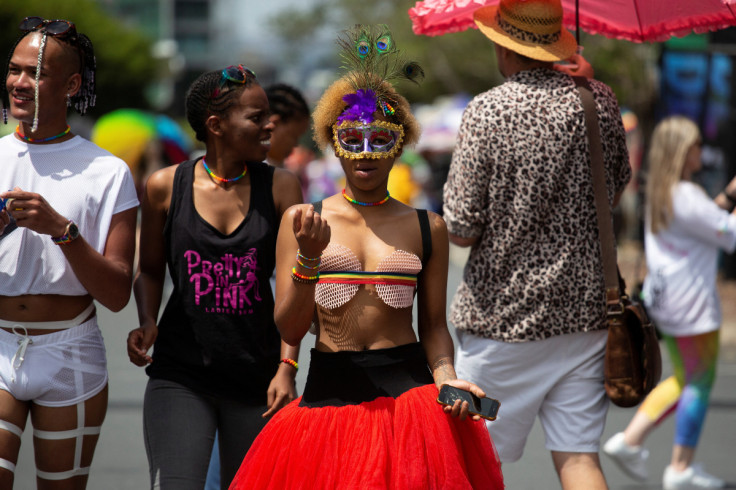Manufacturing Fear Through Terror Alerts; South Africa, Nigeria Become Latest Victims

Though the U.S. was defeated in Afghanistan last year, the endless war on terror continues elsewhere around the world and it requires manufactured fear which can be hyped endlessly, as happened with South Africa and Nigeria in October-end.
On Oct. 26, the U.S. said terrorists were planning to conduct an attack targeting large gatherings of people at an unspecified location in the Sandton area of Johannesburg on Oct. 29.
Sandton is one of the posh areas in South Africa, home to luxury boutiques, major corporations and upmarket restaurants and hotels.
On Oct. 28, State Department spokesman Ned Price hailed security arrangements made by South Africa and Nigeria, where the U.S. issued a separate security alert and evacuated families of U.S. government personnel.
"We deeply appreciate efforts that they make to protect their interests and in turn our interests," Price told reporters, according to AFP.
However, the terror alert proved a hoax as thousands of people assembled in South Africa's largest city Johannesburg, on Oct. 29 to take part in Pride March despite a U.S. embassy warning of a possible terror attack.
Under heavy security, the event took place in the upmarket district of Sandton after the South African authorities assured organizers it was safe to proceed with the gay pride event, held after a two-year break because of the pandemic.
On Oct. 26, the U.S. issued a security alert about the possibility of terror attacks in South Africa just three days after the U.S. warned its citizens in Nigeria about possible terror attacks in different parts of the country, including the capital Abuja and suspended consular services in the Nigerian capital.
The U.S., however, failed to add further information regarding the timing, method, or target of the potential attack.
The U.S. also did not share further intelligence on the nature of the attack with the two governments and could not even back it up with credible evidence.
Though South Africa and Nigeria downplayed the U.S. warning of a possible terrorist attack, other Western nations like Britain, Canada and Australia took the threat seriously and repeated the warnings.
"There's a heightened threat of terrorist attack globally against UK interests and British nationals, from groups or individuals motivated by the conflict in Iraq and Syria. You should be vigilant at this time. The main threat is from extremists linked to Daesh (formerly known as ISIL or ISIS)," the UK government said in a statement.
The U.S. warning had angered South Africa, with its President Cyril Ramaphosa calling the warning unfortunate.
"Should the need arise; the South African government will be the first to inform the public about any imminent threat," President Cyril Ramaphosa's office said.
Unlike other African nations which are fighting against Islamist militant groups, South Africa is at peace and threat alerts are rare.
Shortly after releasing the statement, the U.S. evacuated its staff and citizens from Nigeria. Images of U.S. nationals leaving the country created panic, and the Department of State Services in Nigeria released a statement, asking Nigerians to remain calm.
Nigeria's Minister of Information, Lai Mohammed, alleged that the evacuation created panic. Nigeria condemned the warning, and termed the warning as 'clickbait.'
The U.S. may have enough reasons to issue terror alerts to two of the leading nations in Africa. However, the damage is already done, at least on the diplomatic front.
Although September 2022 marked the 21st anniversary of the War on Terror, the U.S. has never declared an end to it. In fact, the wars initiated in the name of the War On Terror in Afghanistan and Iraq turned into a nightmare for the U.S. It is still continuing with a commitment to large ground wars and "ending the endless wars" – a promise made by former President Donald Trump, but never kept it.
The War On Terror has seen a wide range of violent policies and interventions in the name of "fighting terrorism", both domestically and abroad, and have been institutionalized. Under it, public safety has been weaponized to make way for the ends justify the means approach.
The War on Terror is primarily associated with militarism and warfare and Islamophobic narratives are used to justify it regardless of party affiliation and personal promises of the leader in charge of the U.S. administration. Four presidents, including the current incumbent, over the last 21 years have relied on ways to expand the war on terror any way they saw fit.
In June 2021, President Biden informed Congress that the U.S. "continues to work with partners around the globe, with a particular focus on Africa and the Middle East," on counterterrorism operations.
At times, fake terror alerts yield more political bargaining power as manufactured terror alerts are almost always unprovable.
They are used to keeping people living in fear through constant security checks and it gives the government free reign to do whatever it sees fit.
© Copyright 2025 IBTimes IT. All rights reserved.




















